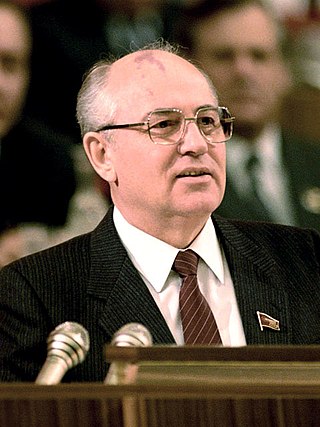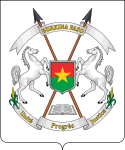
The president of the Soviet Union, officially the president of the Union of Soviet Socialist Republics, abbreviated as president of the USSR, was the head of state of the Union of Soviet Socialist Republics from 15 March 1990 to 25 December 1991.

André-Dieudonné Kolingba was a Central African politician, who was the fourth President of the Central African Republic (CAR), from 1 September 1981 until 1 October 1993. He took power from President David Dacko in a bloodless coup d'état in 1981 and lost power to Ange-Félix Patassé in a democratic election held in 1993. Kolingba retained the strong support of France until the end of the Cold War in 1992, after which both internal and external pressure forced him to hold presidential elections which he lost.

The prime minister of Turkey, officially the prime minister of the Republic of Türkiye was the head of government of the Republic of Türkiye from 1920 to 2018, who led a political coalition in the Turkish Parliament and presided over the cabinet. Throughout the political history of Turkey, functions and powers of the post have changed occasionally. Prior to its dissolution as a result of the 2017 Constitutional Referendum, the prime minister was generally the dominant figure in Turkish politics, outweighing the president.

Nereu de Oliveira Ramos was a Brazilian political figure. He briefly served as interim president of Brazil in the aftermath of the political crisis which culminated in the suicide of President Getúlio Vargas and the impeachment of Deputy Carlos Luz and President Café Filho.

Elections in Togo take place within the framework of a presidential system. Both the President and the National Assembly are directly elected by voters. Togo is a one party dominant state with the Union for the Republic in power.

The vice president of Nigeria is the second-highest officer in the executive branch of the federal government of Nigeria, after the president of Nigeria, and ranks first in the presidential line of succession. Officially styled vice president of the Federal Republic of Nigeria, the vice president is directly elected together with the president to a four-year term of office.

The unicameral National Assembly is Niger's legislative body. The National Assembly may propose laws and is required to approve all legislation.

The Republic of Niger has had seven constitutions, two substantial constitutional revisions, and two periods of rule by decree since its independence from French colonial rule in 1960. The current "Seventh Republic" operates under the Constitution of 2010.

The Coup of 18 Fructidor, Year V, was a seizure of power in France by members of the Directory, the government of the French First Republic, with support from the French military. The coup was provoked by the results of elections held months earlier, which had given the majority of seats in the country's Corps législatif to royalist candidates, threatening a restoration of the monarchy and a return to the ancien régime. Three of the five members of the Directory, Paul Barras, Jean-François Rewbell and Louis Marie de La Révellière-Lépeaux, with support of foreign minister Charles Maurice de Talleyrand-Périgord, staged the coup d'état that annulled many of the previous election's results and ousted the monarchists from the legislature.
The 1996 Nigerien coup d'état was a military coup d'état which occurred on 27 January 1996 in Niamey, Niger. It ousted Niger's first democratically elected president, Mahamane Ousmane after nearly three years in power and installed General Ibrahim Baré Maïnassara as head of state. Prime Minister Hama Amadou was arrested in the coup and several soldiers and presidential guards were killed in the fighting.

Senate of the Republic was the upper house of Turkish Parliament between 1961 and 1980. It was established with the Turkish constitution of 1961 and abolished with the 1982 constitution, although it did not exist after 12 September 1980 as a result of the 1980 coup d'état.

The 1987 Transkei coup d'état was a bloodless military coup in Transkei, an unrecognised state and a nominally independent South African homeland for the Xhosa people, which took place on 30 December 1987. The coup was led by the then 32-year-old Major General Bantu Holomisa, the Chief of the Transkei Defence Force, against the government of Prime Minister Stella Sigcau (TNIP). Holomisa suspended the civilian constitution and refused South Africa's repeated demands for a return to civilian rule on the grounds that a civilian government would be a puppet controlled by Pretoria.
The 1974 Upper Voltan coup d'état was a bloodless military coup which took place in the Republic of Upper Volta on 8 February 1974.

The 1990 Ciskei coup d'état was a bloodless military coup in Ciskei, an unrecognised state and a nominally independent South African homeland for the Xhosa people, which took place on 4 March 1990. The coup was led by the then 37-year-old Brigadier Oupa Gqozo, the Chief of Staff Intelligence of the Ciskei Defence Force, against the government of President for Life Lennox Sebe (CNIP), who was on a state visit to Hong Kong at the time. The coup was followed by widespread rioting and looting, prompting Gqozo to request that the South African government send SADF troops to help restore order.

The 1990 Venda coup d'état was a bloodless military coup in Venda, an unrecognised state and a nominally independent South African homeland for the Venda people, which took place on 5 April 1990. The coup was led by the then 48-year-old Colonel Gabriel Ramushwana, the Chief of Staff of the Venda Defence Force, against the government of President Frank Ravele (NPV).













